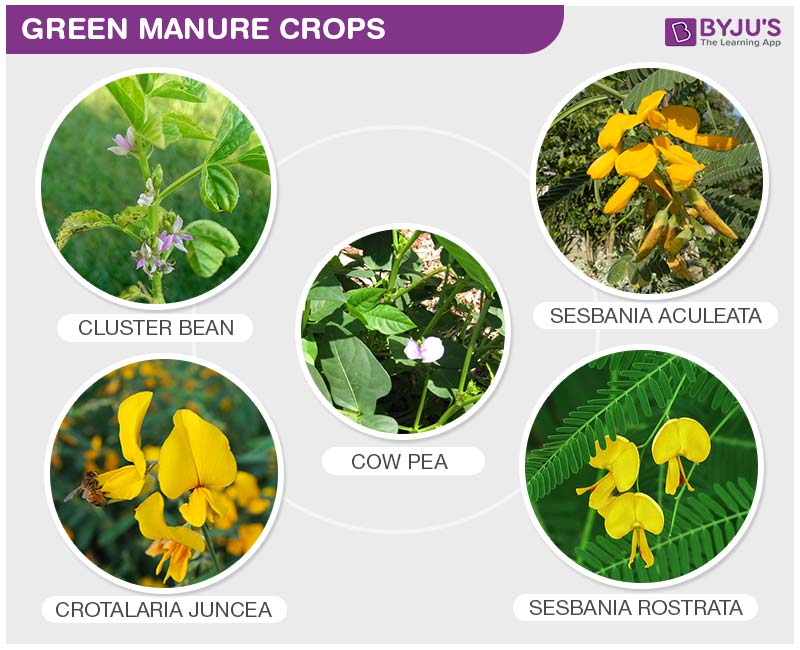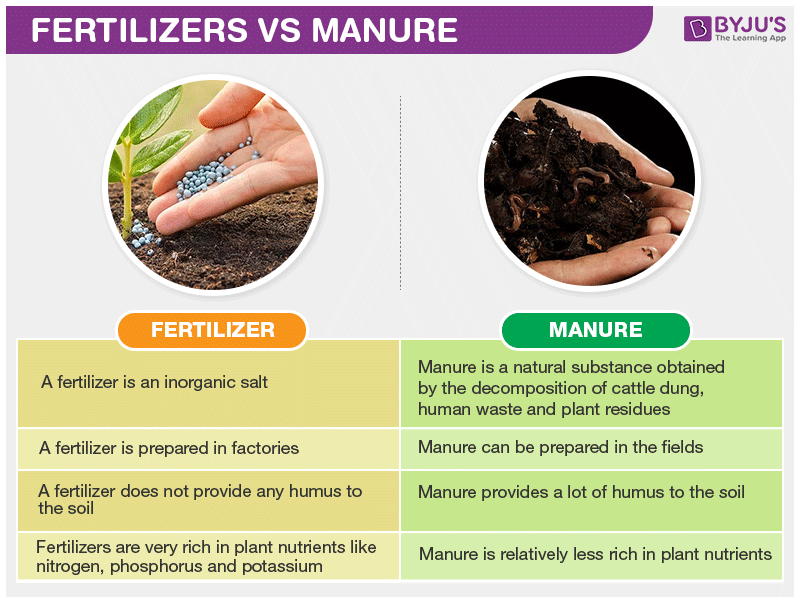Whether it is a small scale or large scale farming, the ultimate goal is to achieve economically feasible profits/yield. This requires good crop production and management practices like preparation of land, seed selection, usage of fertilisers, etc.
Usage of fertilisers is one of the processes adopted by farmers to increase the yield. However, their overuse can lead to a loss of capital in addition to crop loss. Most farmers are not aware of the effect of fertilisers, especially in developing countries.
Soil is the primary resource of nutrients like minerals for the crop. However, some types of soil are not rich in minerals or are infertile. Even repeated farming can result in loss of fertility of the soil. In such cases, the soil is to be replenished with nutrients from the external source.
Also Read: Agriculture and Fertilisers
Manure and Fertilisers

Manuring is the process of addition of natural or chemical sources of nutrients for the crop. Natural sources include dead wastes of plants, humans and animals, excreta and other wastes. These on decomposition give organic products called organic manure or simply manure.
Manure improves the water holding capacity, aeration, and texture of the soil. These lead to the development of a new method of farming called organic farming where only organic fertilisers, pesticides, etc. are used.
Fertilisers are chemical compounds which include salts or organic compounds like urea, ammonium sulfate, sodium nitrate etc. They are the sources of plant nutrients like potassium, nitrogen, and phosphorus. Fertilisers are commercial products mainly manufactured in factories. They have enhanced the yield spontaneously.
Chemical fertilisers should be used in optimum amount with great care. Their excess use may lead to soil infertility, water pollution, and even cause disease. Overall, it damages the crop. Hence it is advisable to use organic manure instead of chemical fertilisers.
Other alternative methods for soil replenishment are vermicomposting, crop rotation, growing of leguminous plants, etc.
- Vermicompost or vermiculture is the compost obtained by the activities of various strains of earthworms on organic wastes. These are used as manure.
- Crop rotation is an ancient method where different types of crops are cultivated in alternate years. This increases the mineral content of the soil. In some regions, leguminous plants like pea plants are also used in crop rotation.
- The root nodules of leguminous plants consist of nitrogen-fixing bacteria such as Rhizobium. These bacteria fix atmospheric nitrogen in the soil, thereby increasing its fertility.
Soil replenishment is essential for the healthy growth of the crop.
Difference between Fertilizer and Manure

Difference between Manure and Fertiliser
Following are the important difference between fertiliser and manure:
| Fertiliser | Manure |
| It may be an artificial or natural substance. | It is a natural substance. |
| These are chemicals that are added to the soil to increase its fertility and productivity. | These are obtained from dead and decaying plants and animals. |
| Prepared in factories. | Prepared in fields. |
| Does not provide humus to the soil. | Provides humus to the soil. |
| Rich in plant nutrients. | Less rich in plant nutrients. |
| Absorbed by plants quickly. | Absorbed by plants slowly. |
| Costly | Comparatively cheaper and cost-effective |
| It harms the organisms present in the soil and also causes health issues in people consuming the crop. | It causes no harm to the organisms and improves soil quality. |
Explore More:
- Fertiliser
- Manure
Register with BYJU’S to learn more about the difference between fertiliser and manure. Alternatively, download BYJU’S app for an engaging learning experience for all classes.
Frequently Asked Questions
What is a fertiliser?
A fertiliser is a natural or chemically synthesised material applied to the soil to increase its fertility and productivity.
What is manure?
Manure is the organic matter obtained naturally from decaying plants and animals. It is also obtained from animal and human faeces and also, from domestic wastes such as vegetable peels.
Which is better, fertiliser or manure?
Manure is better than fertiliser. Manure is derived naturally and adds a lot more than just nutrients to the soil. They increase the activity of the microbes in the soil and increase its fertility. On the other hand, fertilisers harm these microbes and cause health issues in the consumers since they are synthesised chemically.
Can manure be used in organic farming?
Manure conditions the soil. It adds nutrients to the plants and is a key fertiliser in organic farming. It is therefore allowed by National Organic Program Standards.
What is organic fertiliser?
Organic fertilisers are obtained from human and animal excreta, and vegetable wastes. The animal waste obtained from the processing of meat, slurry and manure forms the most effective organic fertilisers.
How are manure and fertilisers similar?
Both manure and fertilisers help to increase the productivity of crops. They provide nutrition to the plants and help them to grow. They enrich the soil and increase its fertility.
How are manure and fertilisers different?
Though manure and fertilisers add to the fertility of the soil, they are different from each other. Manures are obtained from natural sources, whereas fertilisers are synthetically manufactured in the factories. Manures are eco-friendly, whereas fertilisers harm the useful microbes present in the soil and also decrease the soil fertility if used for a longer time.

IT WAS FANTASTIC INFORMATION
well very intresesting thing
Wow it is very useful indeed and so interesting.
Great. Very nice to read and know. thank you very much for sharing your experitise
Nice this is very good
Nice information
The application system is nice.
If manure is better than chemical /mineral fertiliser, then which animal manure is the best? Can you give a list/table of comparison between all types of animal manure used in organic farming & gardening? Thanks.
What if you do your compost with grass, I mean that you cut grass and decompose
its nice
Fantastic information
This answer is very easy. I am thank ful to you sir